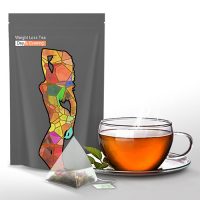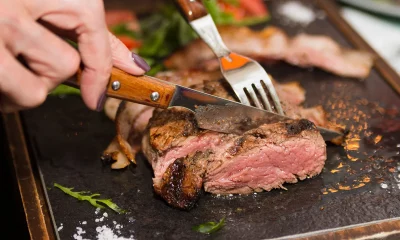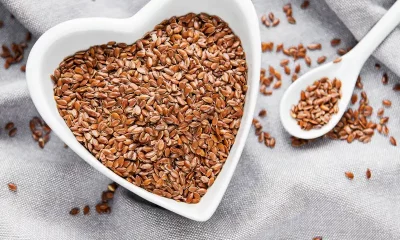Health
60 tips for healthy weight

Discover the 60 tips for healthy weight loss.
Excess weight can be considered not as an essentially aesthetic problem, but as a personal health problem.
In addition to the damage caused by excess body fat, the overweight individual is also frequently exposed to other health problems, since overweight and obesity are associated with an unhealthy diet and lifestyle sedentary.
As if that were not enough, some people, influenced by unrealistic beauty standards, end up looking for shortcuts to lose weight, resorting to fad diets, which are often harmful to health, or the use of chemical substances, often without the help of an experienced professional.
The point of this article is not to present miracle weight loss formulas or to teach secret tips that will make you lose weight quickly and effortlessly. That does not exist.
The objective of this text is to show that the implementation of small changes in eating habits and lifestyle can have a great impact in the medium and long term on the control of ideal body weight.
60 tricks to maintain a healthy weight
The weight loss process can be summed up as the simple difference between the number of calories you consume per day minus the number of calories your metabolism burns daily.
That is, if you eat more calories than you burn over several days, you will gain weight.
On the other hand, if your daily calorie intake is less than the number of calories your body burns, you will lose weight.
If the intake and burning of calories are the same, your weight will remain stable over the weeks.
Therefore, we can share our tips in 2 groups:
• Tips for consuming fewer calories throughout the day.
• Tips to increase your calorie burn throughout the day.
Tips to consume fewer calories
1- Avoid the consumption of sodas with sugar. A single can of Coca-Cola has 35 grams of sugar, which offers 139 kcal.
Just as a comparison, 35 grams of sugar is 8 to 10 tablespoons of sugar. Already 139 kcal is the average expenditure of a 40-minute walk.
If you consume more than one can of Coca-Cola a day, simply stopping this consumption will make you lose a good amount of kilos in a few weeks.
Diet sodas may not be a healthy drink, but they are much better than non-diet sodas in terms of sugar and calorie intake.
2- It is not only soft drinks that contain excess sugar. Before buying a drink, look at the amount of sugar and calories in it.
Energy drinks and products for hydration during physical activity, such as Gatorade and Powerade, also have excess sugar.
A bottle of Gatorade, for example, has 30 grams of sugar or about 8 teaspoons of sugar.
3- Do not be fooled by industrial products that are called natural. Many brands of boxed or bottled juices, which claim to be made with 100% fruit, actually add sugar to enhance the flavor.
Just because orange juice is made with real orange does not mean that the manufacturer did not add sugar to its formula.
See the nutritional references on the back. If sugar has been added, avoid, because the fruit itself is a food rich in carbohydrates.
4- At mealtimes, do not fill the plate. Put less food than you think is necessary. At the time of hunger, our ability to estimate the necessary amount of food is compromised, and, many times, we eat more than we need just to avoid leaving the leftovers on the plate.
5- Following the same logic as the previous topic, use smaller plates. A small full plate can pass the feeling that there is the ideal amount of food better than a large empty plate.
6– Do not feel obliged to always finish the plate. If you are satisfied, stop eating even if there is food on the plate.
7- Eat only in one place in the house, for example, in the living room or the kitchen. This can break the habit of eating in certain places in the house outside of mealtimes, such as at the office, in bed, in front of the TV, etc.
8- Create a reward system at the end of the day or week after following a diet with fewer calories.
Rewards can be anything that makes you feel good: go to the mall, get a haircut, manicure, rent a movie, get massages, have sex, etc.
Family collaboration is very important in this system. The reward should not be for weight loss, but better habits. Note: Never use food as a reward.
9- Find out which feelings or activities most frequently activate the trigger of the desire to eat. Try to have control over these situations. If possible it is good to eliminate them.
10- See which are the hypercaloric foods that you consume the most. Stop buying them. If you have it at home, it is almost impossible not to consume. The best way not to eat something with too many calories is not to have easy access to it.
11- Create a journal or blog about your diet. Write daily about successes and failures. Seeks to learn from the mistakes of the previous days.
12- After each bite, take a sip of water. This will make the stomach fill more quickly, reducing the amount of food needed to meet your needs. When the stomach is full, the body releases neurotransmitters responsible for feeling full.
13- Eat slowly, chew your food well and take breaks during your meal. It allows time for the body’s satiety mechanisms to kick in.
14- Vegetables and legumes are not only healthy, as they have few calories. If you eat a good salad during your meal, you will be taking up space in your stomach with food that provides few calories.
Eat the salad before preparing the main dish or reserve at least 50% of the main dish space for vegetables and legumes.
15- It is useless to eat salad if you are going to fill it with sauces, especially those based on mayonnaise and cheese, which are calories.
16- Make a longer interval between food and dessert. See if you really need it or if the candy is simply a habit or a form of reward
17- Brush your teeth as soon as you finish eating; that will make you think twice about choosing dessert.
18- Fight boredom with activities, not with food. Try drinking a glass of water before pinching a treat to see if the urge to eat passes.
19- Olive oil is a healthy type of fat, but it has a lot of calories. If the goal is to lose weight, filling your food with oil is not going to help. Use it in moderation.
20- Avoid frying foods that can be cooked. This drastically reduces the number of calories in food.
21- Avoid breaded foods, parmesan, gratin, sauces rich in mayonnaise, four-cheese sauces, fried foods, or other foods rich in fat, since they tend to be hypercaloric.
22- Roast chicken is a good option, but it should be eaten without the skin.
23- Fish is the best meat option.
24- Eliminate fast foods from your diet. They are nutritionally poor and calorie-dense foods.
25- Sleep at least 7 to 8 hours a day. Our body expends more calories when we are sleeping in deep sleep than when we are just lying down, reading, or watching TV. Those who sleep little have a greater risk of gaining weight.
26- Ask a nutritionist for help to prepare a diet with the ideal amount of calories for you.
27- When shopping, if there is more than one similar product on the supermarket shelf, check the nutritional information for the option with the least calories.
28- Never buy a product without first consulting the nutritional information, especially the number of calories in the food.
Over time, you will learn to identify the best foods for losing weight or keeping it healthy.
29- Understand that food re-education is far superior to any diet. It may take longer to reach your desired weight, but you will surely have an easier time maintaining your desired weight in the long term.
30- When buying dairy products, always try the skim, light, or lean versions. This works for yogurts, milk, cheeses, etc.
31- If you want to eat ice cream, the popsicle is a better option than box ice cream.
32- Whole foods are healthier, have more fiber and fewer calories. The fibers help induce a feeling of fullness.
33- Alcoholic beverages are hypercaloric. The higher the alcohol content, the more calories the drink contains.
34- Avoid buying prepared meals in supermarkets. In addition to being hypercaloric, they tend to have a large amount of salt.
35- You do not have to eliminate any type of food. If you can’t live without pizza on the weekend, calculate how many calories you can consume throughout the day.
You can have a pizza for dinner on Saturday, as long as you have lighter meals throughout the day.
It is important to avoid flavors that are high in fat and calories, such as four kinds of cheese or bacon.
Remember that each slice of pizza can contain between 200 and 300 kcal. The less greasy the pizza is, the more slices you can consume.
36- Losing weight is much easier than maintaining the lost weight. To maintain a healthy weight you need to change your lifestyle and eating habits, otherwise, you will continue to suffer the rebound effect, alternating periods in which you gain weight and lose weight. There is no use dieting if this diet does not teach you to eat better for the rest of your life.
Tips to burn more calories
37- Do not skip breakfast. When we are fasting our metabolism slows down and the body starts to consume not only fat but also muscle mass.
The reduced metabolism ends up making the calories not consumed at breakfast have little effect on weight loss.
It is better to eat a healthy breakfast, with fresh fruit, whole grain bread or cereals, and lean cheese, than to stay on a fast waiting for lunch.
38- Do not do long periods of fasting during the day. Avoid being hungry. It is better to eat 5 or 6 small meals during the day, with a few hours apart, than 2 or 3 large meals spaced apart.
Long intervals between hours slow down the metabolism and increase the release of insulin when eating, two factors that prevent the patient from losing weight.
You cannot consume hypercaloric foods in these meals during the day. Eat a small meal every 4 hours. Leave low-calorie cereal bars or crackers in your pocket or purse.
39- A great mistake of people trying to lose weight is to believe that it is easy to do it only by reducing calorie intake.
Increasing your daily caloric expenditure through exercise greatly facilitates weight loss. In the same way that a correct diet is a matter of habit, practicing exercises is also a matter of habit.
40- Physical exercises burn calories not only at the time of exercise but also for several hours later.
41- A person who exercises regularly burns more calories at rest than a sedentary person. Even sleeping, the metabolism of those who exercise is faster than that of sedentary people.
42- Both aerobic exercises and bodybuilding help you lose weight.
43- A kilo of muscle burns 2.5 times more calories than 1 kg of fat when at rest. When we gain muscle mass, we are increasing our basal calorie intake.
Up to 75% of the calories consumed in a day is done at rest through the basal metabolism of our body, therefore, the more muscle mass we have, the better we can burn calories, even when sleeping or watching TV while lying on the couch.
44- If you do not have cardiovascular or osteoarticular problems, give preference to more intense aerobic exercises to lose many extra calories a day.
A spin class, for example, can make you lose 500 to 800 calories in a single day. This without counting the cardiovascular benefits of having good aerobic endurance.
45- If you have time, try to do 30 minutes of aerobic exercises and then 30 minutes of bodybuilding. The ideal frequency is 4 to 5 times a week.
46- Any degree of exercise is better than none, however, aerobic exercise with less than 20 minutes of duration is not as efficient to burn fat.
In the first minutes, we burn only the sugar reserves. To reach fat stores, it takes at least 20 to 25 minutes of continuous exercise.
47- If you can’t or can’t run, walk. Walking 30 minutes a day is enough.
48- The ideal during physical activity is to keep your heart rate constantly high. Walking and stopping, walking and stopping, as some people do in their day-to-day work, doesn’t work as well as a half-hour uninterrupted walk.
49- If possible, go to work by bicycle. Leave the car at home. Most of the cities in the world have bike lanes built to make the population healthier.
50- If leaving the car at home is impractical, try to park it further away then. Walk a bit to get to work.
51- Replace the elevator with the stairs. This helps you lose weight and still strengthens your lower limbs.
52- Bodybuilding can be done at any age as long as it is accompanied by a qualified professional. The elderly can not only how they should exercise their muscles
53- The older a person, the more important bodybuilding becomes to avoid the reduction in basal caloric expenditure with the natural fall in metabolism.
54- Doing dozens of repetitions of abdominal exercises will not make your belly disappear if you do not lose weight.
You can even create abdominal muscles, but since the fat is more superficial, they will be hidden.
The belly disappears doing aerobic exercises and bodybuilding in general.
55- During bodybuilding, work large muscle groups, such as the chest, back, and thighs, since they are bigger muscles and easier to develop; they will make you lose weight faster.
56- If you cannot stand running or doing bodybuilding, there are several alternatives, such as group sports (soccer, basketball, volleyball), dance, aerobics classes, canoeing, mountaineering, climbing, hiking, yoga, Pilates, etc. An hour of yoga, for example, can help you burn up to 350 kcal.
57- Swimming is a great exercise to lose weight because it is aerobic and stimulates the development of muscles.
58- Exercises in the morning give better results than at the end of the day when you are already tired.
59- Cycling is another excellent option and can be done as a family. It strengthens the muscles and is an aerobic activity.
60- Any physical activity is better than no activity. If you are not used to exercising, start slowly.
Find activities that are not painful. Losing weight should be a goal in the medium and long term.
If you don’t like exercising and are still looking for immediate results, this is the first step to giving up early.
Health
8 shocking health benefits of Tamari

Table of Contents
Health
16 Benefits of Taurine and side effects

- Benefits of Taurine
- 1.- Antioxidants
- 2.- Reduce inflammation
- 3.- Fight infections
- 4.-Help fight cancer
- 5.-Treat diabetes
- 6.-Protects the heart
- 7.- Prevents hypertension
- 8.- Reduces cholesterol
- 9.-Protects the liver
- 10.- Parkinson’s disease
- 11.- Weight loss
- 12.- Athletic performance
- 13.- Immune function
- 14.- Muscle development
- 15.- Protects vision
- 16.- It is good for lung health
- Frequently asked questions about the benefits of taurine
- Taurine Side Effects
- Dosage
Discover the 16 Benefits of Taurine and side effects.
Taurine is a semi-essential organic compound. Although scientists have known it for more than two centuries; The health benefits of taurine have recently become clear.
A diet rich in taurine can protect the body and promote longevity.
Taurine supplements are non-toxic, cheap, and freely available. Read on to understand why you should consider taurine supplementation and not believe its bad reputation.
Benefits of Taurine
Taurine supplements are recommended for some people, depending on their specific health goals and medical conditions, but it’s important to understand the details of dosage and potential effects.
The most impressive taurine benefits include the following:
•Treatment of Parkinson’s disease
•Improving athletic performance
•Preventing heart disease
•Reducing the risk of diabetes
•Weightloss
•Preventing metabolic syndrome
•Reduce periodontal disease
•Improving muscle growth
1.- Antioxidants
Tissues exposed to oxidative damage have particularly high concentrations of taurine. Like other antioxidants, taurine benefits by directly and indirectly removing harmful oxidants to minimize tissue damage.
Through its antioxidant and anti-inflammatory activities, taurine can protect our bodies from unnecessary cell death and tissue damage.
2.- Reduce inflammation
The antioxidant action of taurine benefits produces taurine chloramine (Taul) and bromine (TauBr), which also have anti-inflammatory properties.
Taurine supplementation enhances the formation of TauCl and TauBr in the body and may be effective in treating inflammatory conditions.
Taurine is very effective in treating acute inflammation (caused by infection, irritants, damaged cells, or cancer). However, its role in the progression of inflammatory diseases (such as arthritis) is less clear.
Decreased Taul generation in the body can worsen inflammation-related joint damage in rheumatoid arthritis.
Taul injections improved arthritis symptoms in various experimental animal models.
The gene for the taurine transporter (TauT) has also been linked to the inflammatory response.
3.- Fight infections
The antimicrobial effects of taurine benefits in the body come from taurine chloramine (Taul) and taurine bromine (TauBr) formation.
Taul and TauBr are capable of killing a wide spectrum of bacteria, fungi (yeasts and molds), viruses, and parasites.
Both Taul and TauBr are promising treatments for infections such as chronic sinusitis, otitis media (swimmer’s ear), acne vulgaris, and gum disease.
Taul and TauBr break down quickly in our bodies and are only effective if used topically, not supplemented. However, taurine supplementation can increase the production of these compounds in our bodies.
Taurine’s role as an antioxidant is also important for the protection of the cells of our immune system.
Taurolidine, another taurine derivative, is commonly used in Europe and the US to help treat various infections.
The white blood cells (neutrophils) of rats supplemented with taurine have an increased ability to destroy invading bacteria.
4.-Help fight cancer
Taurolidine, a taurine derivative that is converted to taurine within the body, increased cancer survival rates in animal models; it also blocked the growth of colorectal cancer in rats.
Cancer patients have reduced levels of taurine. Surgery and chemotherapy further lower taurine levels and can reduce taurine in cancer patients. Therefore, taurine supplementation can be very beneficial for cancer patients.
5.-Treat diabetes
Antioxidants, such as taurine, are low in diabetic individuals. This increases the risk of oxidative damage; diabetes decreases the body’s ability to absorb taurine.
Diabetic complications, such as heart, kidney, and nerve damage, can be attributed to high oxidative damage as a result of low taurine levels.
In a study of 39 types 1 diabetic patient, oral supplementation with 500 mg of taurine three times daily for 3 months restored blood taurine levels. Taurine supplementation also prevented blood cells from clotting, lowering the risk of a heart attack.
In rats, taurine also lowers blood glucose by interacting with insulin receptors on cells.
The role of taurine benefits in protecting the kidneys from damage in diabetes is well documented in animal models and human cells.
One and a half grams of taurine daily for two weeks improved early cardiac abnormalities in a study (DB-RCT) of nine types of diabetic patients.
6.-Protects the heart
Cells of the heart and blood vessels contain the taurine transporter, suggesting that the benefits of taurine are important for heart function.
Heart disease induced by taurine-deficient diet in various animal studies.
The risk of chronic heart disease is lower in individuals with a high urinary production of taurine.
In a study of 22 healthy middle-aged women, 3 g of taurine supplements daily for 4 weeks lowered homocysteine levels. Since homocysteine correlates with heart disease, taurine may help prevent heart attacks or high cholesterol.
Taurine can also prevent abnormal heartbeats (AFib)
Taurine supplementation is effective in treating the hardening and narrowing of blood arteries in animals.
Although more research is needed, the positive effects of taurine’s benefits on the heart are thought to:
•Improves fat profile
•Helps control calcium ion uptake and thus cell excitation
•Acts as an antioxidant
•Prevents contraction of blood vessels
7.- Prevents hypertension
Taurine can increase the production of endorphins by the brain (hypothalamus). This calms the brain’s fight or flight response, which is overactive during stress, and lowers blood pressure.
Low levels of taurine are associated with increased blood pressure.
Oral taurine supplementation is potentially a very safe and convenient regimen for the control of high blood pressure.
Consumption of 3g of taurine per day for 2 months in hypertensive patients reduced both systolic and diastolic blood pressure.
It also plays a protective role in the heart and kidneys in rats with hypertension.
8.- Reduces cholesterol
Taurine supplementation can improve bile secretion and activity and improve the body’s breakdown of cholesterol.
It is also essential for the formation of bile salts and as such plays an important role in the absorption and breakdown of fats and cholesterol.
Additionally, taurine can lower blood and liver cholesterol levels in animals fed a high-fat diet.
9.-Protects the liver
Taurine supplementation in the diet at doses greater than 500 mg daily for 3 months reduced liver injury in 24 patients with chronic hepatitis.
In rats, dietary taurine protected their livers from damage related to heavy metals and oxidized fat.
Taurine availability in the body is low in various forms of liver cirrhosis. In 35 patients with liver cirrhosis, daily taurine supplementation increased taurine levels and also reduced painful muscle cramps that are associated with cirrhosis.
In animal models, taurine is effective in preventing non-alcoholic fatty liver disease. It reduced oxidative stress, cell death, and fat accumulation in the liver.
Taurine supplementation also prevented alcoholic fatty liver disease in animals by decreasing alcohol-induced oxidative stress and inflammation. It also increased the production of proteins associated with the breakdown of fats in the liver.
Animal studies suggest that taurine prevents long-term liver damage and helps liver cells recover more quickly from fatty and alcoholic liver disease.
10.- Parkinson’s disease
Research has shown that when people have adequate or high levels of taurine in their system, neuronal cell regrowth is possible, which may help reverse or mitigate the effects of certain neurodegenerative diseases, such as Parkinson’s disease.
11.- Weight loss
Lowering fat levels in the bloodstream and helping the body deal with excess blood glucose are two of the best benefits of taurine; therefore, they can help optimize the process of weight loss and fat burning.
12.- Athletic performance
This organic compound has become a very popular training supplement as it is known to allow muscles to work longer, safer, and more efficiently, which means your workouts will have better results and your recovery time will be faster. shorter.
13.- Immune function
Having adequate levels of taurine in your body can help your immune system regulate its actions, meaning your body is less likely to experience allergic reactions and other unnecessary energy expenditure.
14.- Muscle development
Taurine benefits are known to aid in skeletal muscle differentiation, and later in life, having adequate levels can help you grow and strengthen your muscles more effectively, making it a popular additive for bodybuilders and powerlifters. dumbbells.
15.- Protects vision
Taurine benefits protect retinal cells from damage caused by oxidants and bright light; In a study (DB-CT) of 62 patients, a combination of taurine, diltiazem, and vitamin E helped decrease vision loss by protecting against oxidative damage.
Low levels of taurine are associated with cataract formation in humans.
In cats, taurine deprivation causes vision loss.
In rats, the antiepileptic drug Vigabatrin depletes retinal taurine. As a result, prolonged use of this drug can lead to irreversible vision loss.
16.- It is good for lung health
The antioxidant activity benefits of taurine can protect the lungs from damage caused by exposure to toxins such as cigarette smoke.
Taurine-fed hamsters can resist lung damage caused by exposure to air pollutants.
Maintenance of tissue taurine levels is critical for the prevention of oxidant-induced lung injury in rats.
In sheep, the taurine-derived taurolidine (which is converted to taurine in the body) prevents lung damage caused by bacterial toxins.
Frequently asked questions about the benefits of taurine
-What is taurine?
Taurine (L-taurine or 2-aminoethane sulfonic acid) is a sulfur-containing amino acid.
Mammals have taurine in almost all tissues, but the heart, brain, retina, platelets, and glands contain particularly high amounts.
Taurine plays a crucial role in the development and protection of cells within mammals; controls multiple important biological processes in the body.
In this sense, taurine could be more easily compared to sodium or calcium ions than to a drug that targets a specific receptor in our body.
Humans are capable of producing taurine, but not in sufficient quantities. Therefore, taurine is a conditionally essential amino acid for humans; Some conditions in which patients may be deficient in taurine include premature infants, newborns, and patients with chronic liver, heart, and kidney disease.
This supplement is also an osmolyte. This means that it controls the entry and exit of water in the cells and prevents them from changing the cell too much; It interacts with fats in cell membranes and stabilizes them, preventing structural changes in the cell.
Despite the impressive range of positive effects that taurine has on the body, its exact mechanisms of action remain largely unknown.
-How does the body produce taurine?
Taurine is synthesized in the body from the only other two sulfur-containing amino acids, methionine and cysteine.
Taurine synthesis occurs primarily in the liver, with the help of the enzyme cysteine sulfinic acid and vitamin B6 (pyridoxine).
Other cells in our body can absorb taurine from the blood thanks to the special taurine transporter molecule (TauT) found in cell membranes.
Taurine is an essential nutrient for newborns as they are not yet able to synthesize or retain taurine within their bodies. Breast milk contains the full taurine requirement for infants, as does modern infant formula.
-How does the body eliminate taurine?
Taurine leaves the body as part of the bile or urine.
The kidneys can increase or decrease taurine excretion depending on the dietary availability of taurine. High amounts of taurine in urine indicate high dietary intake.
Taurine carrier molecules in the kidneys use energy to reabsorb and retain taurine in the body.
People with compromised kidney function or defective taurine transporters may not be able to retain sufficient amounts of taurine.
Taurine Side Effects
Taurine remains one of the most important organic compounds within the body, but there are some potential side effects when consuming too much, such as pregnancy complications and worsening of certain nervous system disorders.
Bipolar Disorder: Studies have found that regular or prolonged use of this compound can worsen the symptoms of bipolar disorder, although, in moderate amounts, it may have a mitigating effect on this condition.
Pregnancy: Some of the more popular taurine supplements also contain other active ingredients, including caffeine, that may pose a risk to pregnant or lactating women, so these individuals should avoid the use of this non-essential amino acid.
Dosage
Up to 3 g of supplemental taurine per day is safe for consumption in adults. There is strong evidence that there are no side effects at doses up to and below this value. Scientists do not recommend a dose greater than 3 g per day.
Relatively high amounts of taurine are safe for consumption because any excess can be passed harmlessly through urine.
Health
5 types of teas to lose weight and lose belly fat

Discover the 5 types of teas to lose weight and lose belly fat.
Teas to lose weight are an excellent homemade and natural option to complement a balanced diet, not only for those who intend to lose weight but also for those who intend to lose belly, as well as being a good homemade and natural option.
Ginger tea with pineapple, mate tea with lemon, or green tea with blackberries, as they help reduce fluid retention, satiate the appetite, and increase metabolism, thus burning more calories and body fat. See how to go on a weight loss diet.
Another good strategy is to add a pinch of red pepper to the tea, since this is a thermogenic food that helps increase metabolism, helping to reduce the accumulated fat in the body.
Despite being healthy options to help you lose weight, these teas should not be consumed by pregnant women without a doctor’s indication.
1. Ginger tea with pineapple
Ginger tea with pineapple is excellent for weight loss, as it increases metabolism helping the body to burn more calories, produces a feeling of satiety, and helps improve intestinal function, as it is rich in fiber.
Ingredients
1 peel of half a pineapple;
1 orange peel;
1 tablespoon of carqueja;
1 tablespoon of ginger.
Preparation mode
•Add the pineapple and orange shell and the tablespoon of ginger to 1 liter of water and boil for 3 minutes.
•After boiling, turn off the heat and add the spoonful of Barquera.
•Cover and let stand for 5 minutes, it must be strained before drinking.
It should be taken throughout the day between meals, and for best results, it is recommended to follow a healthy diet and regular physical activity.
2. Green tea with blackberries
Green tea with blackberries is good for weight loss, as it helps reduce appetite, increases metabolism thus burning more energy and calories, and helps improve fluid retention thanks to its diuretic properties.
Ingredients
1 teaspoon of dried blackberry leaves;
1 teaspoon of dried green tea leaves.
Preparation mode
•Place the dried blackberry and green tea leaves in a cup of tea and add 150 ml of boiling water.
• Cover and let stand for 10 minutes, it must be strained before drinking.
This tea should be drunk before the main meals such as lunch and dinner, for 2 to 3 weeks.
3. Jamaica Tea with Cinnamon
Hibiscus tea or better known as Jamaica water is good for losing weight, as it helps with fluid retention by deflating the body due to its diuretic action, increases metabolism by burning more calories, and also helps for good digestion by having cinnamon in its composition.
Ingredients
1 tablespoon of dried hibiscus;
1 tablespoon of horsetail leaves;
1 stick of cinnamon.
Preparation mode
•To a liter of boiling water add the dried hibiscus and horsetail leaves with the cinnamon stick, let it rest for 10 minutes.
•Strain before drinking.
This tea should be drunk 3 to 4 times a day, half an hour before the main meals.
4. Mate tea with lemon
Mate tea with lemon helps you lose weight, as it increases the feeling of satiety and increases metabolism, helping to burn more calories. In addition to this, it reduces swelling in the body due to its diuretic action.
Ingredients
1 or 2 tablespoons of mate tea;
1/2 lemon squeezed.
Preparation mode
•In a cup of tea, place the dried leaves of the mate tea and half a lemon, then add 150 ml of boiling water.
• Cover and let stand for 5 to 10 minutes.
5. Fenugreek Tea with Artichoke
Fenugreek tea with artichoke helps in weight loss, as it generates a greater feeling of fullness and relieves constipation thanks to its fiber content.
Another benefit is that it increases metabolism helping to burn fat and in turn, due to the diuretic action it exerts, it helps to improve fluid retention.
Ingredients
1/2 teaspoon of fenugreek seeds powder;
1 teaspoon of dried artichoke leaves.
Preparation mode
•Put the powdered fenugreek seeds, a pinch of pepper, and the dried artichoke leaves in a teacup, then add 150 ml of boiling water.
•Let stand 10 minutes and then it must be strained.
This tea should be drunk 3 times a day between meals.
We hope the article 5 types of teas to lose weight and lose belly has been of help to you.
-

 Food1 year ago
Food1 year ago10 + Benefits of carrot juice and side effects
-

 Benefits4 months ago
Benefits4 months agoThe Benefits of Joining Gym Lumolog – Improve Your Fitness & Health
-

 Health1 year ago
Health1 year ago50 Super Healthy (And Very Often Cheap) Foods
-

 Health1 year ago
Health1 year ago5 Shocking health benefits of kinkeliba and side effects
-

 Food1 year ago
Food1 year ago8 shocking benefits of leek juice and side effects
-

 Health1 year ago
Health1 year agoBenefits of guava leaves Sensually
-

 Weight Loss1 year ago
Weight Loss1 year agoChaz Bono weight loss secret
-

 Health1 year ago
Health1 year ago13 shocking health benefits of Thai eggplant












